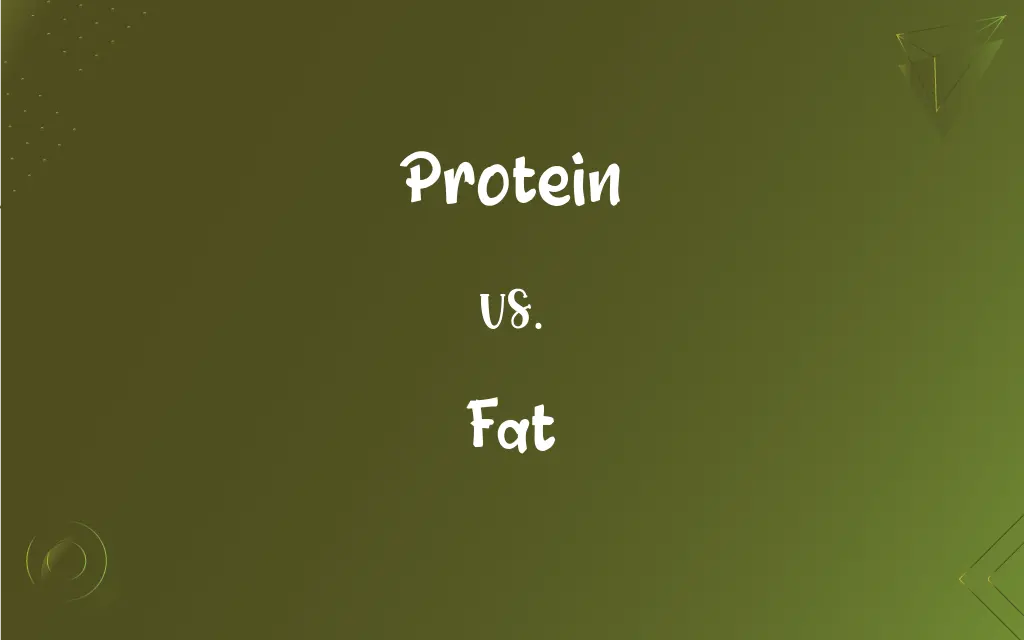Protein vs. Fat: What's the Difference?
Edited by Aimie Carlson || By Harlon Moss || Published on December 12, 2023
Protein is a macronutrient made of amino acids, essential for building and repairing body tissues; fat is a dense energy source and nutrient vital for insulation and cell function.

Key Differences
Protein is a crucial macronutrient composed of amino acids, which are the building blocks for body tissues, muscles, and organs. It plays a key role in growth, repair, and enzyme and hormone production. Fat, on the other hand, is another macronutrient, serving primarily as a dense source of energy, and is essential for various bodily functions, including nutrient absorption and temperature regulation.
Proteins are vital for the immune system and maintaining muscle mass. They are found in meats, dairy, beans, and nuts. Fats are categorized into saturated, unsaturated, and trans fats, playing roles in brain health and hormone production, found in oils, butter, nuts, and fatty fish.
Protein's structure is based on long chains of amino acids, which the body can synthesize or must obtain from food (essential amino acids). Fats consist of glycerol and fatty acids, with variations like triglycerides being the most common form in the body and diet.
Dietary proteins are essential for muscle building and repair, and they also contribute to the feeling of fullness. Fats, while higher in calories per gram than proteins, are crucial for the absorption of fat-soluble vitamins and provide a sustained energy source.
In nutrition, protein is often emphasized for weight management and muscle building. Fats, although essential, are monitored for heart health, with a focus on balancing healthy unsaturated fats against potentially harmful saturated and trans fats.
ADVERTISEMENT
Comparison Chart
Basic Composition
Amino acids
Glycerol and fatty acids
Primary Function
Building and repairing tissues
Energy source, nutrient absorption
Types
Complete and incomplete proteins
Saturated, unsaturated, trans fats
Role in Diet
Muscle growth, enzyme production
Vitamin absorption, energy storage
Caloric Value
Lower calories per gram
Higher calories per gram
ADVERTISEMENT
Protein and Fat Definitions
Protein
Macronutrient made of amino acids.
Chicken breast is a good source of protein.
Fat
Essential for brain health and cell function.
Salmon is rich in omega-3 fatty acids, a type of fat.
Protein
Essential for tissue building and repair.
Athletes consume protein shakes for muscle recovery.
Fat
Stored in the body for energy reserves.
Body fat helps to maintain energy balance.
Protein
Found in meat, dairy, and legumes.
Lentils are a great plant-based protein.
Fat
Vital for nutrient absorption and insulation.
Olive oil contains beneficial monounsaturated fat.
Protein
Key in enzyme and hormone production.
Protein-rich foods help regulate body functions.
Fat
Includes saturated, unsaturated, and trans fats.
Butter is a common source of saturated fat.
Protein
Supports immune function and muscle mass.
A balanced diet includes adequate protein for health.
Fat
A dense source of dietary energy.
Avocado is high in healthy fats.
FAQs
What is the primary function of fat?
As a dense energy source and for nutrient absorption, insulation, and cell function.
How do fats affect cholesterol?
Saturated and trans fats can raise bad cholesterol levels.
How much protein is needed daily?
It varies based on age, sex, and activity level; generally, 0.8 grams per kilogram of body weight.
Can you get protein from plant sources?
Yes, beans, lentils, and tofu are good plant-based proteins.
What are trans fats?
Unhealthy fats often found in processed foods, linked to heart disease.
What is protein?
A macronutrient made of amino acids, essential for tissue repair and growth.
Is all fat bad for health?
No, unsaturated fats like those in olive oil and fish are beneficial.
Are proteins used for energy?
Primarily for repair and growth, but they can be an energy source if needed.
What's the role of fat in vitamin absorption?
Fats help absorb fat-soluble vitamins like A, D, E, and K.
What's a complete protein?
A protein that contains all essential amino acids, like meat and eggs.
What's the difference in caloric value between fat and protein?
Fat has 9 calories per gram, while protein has 4.
How do proteins aid in muscle building?
They provide the building blocks (amino acids) for muscle growth.
Can fats contribute to weight gain?
Yes, if consumed in excess, due to their high caloric density.
Are protein supplements necessary?
Not for everyone; they're beneficial for those with increased needs.
Do vegetarians get enough protein?
With a well-planned diet, yes, through various plant sources.
Can excess protein be harmful?
In some cases, it can strain kidneys, especially in people with kidney disease.
What are healthy sources of fat?
Olive oil, nuts, seeds, avocados, and fatty fish.
Is fat necessary in a healthy diet?
Yes, in moderation, for vital body functions.
How does the body store fat?
As triglycerides in adipose tissue for energy.
What are some high-protein foods?
Meats, dairy, legumes, and some grains.
About Author
Written by
Harlon MossHarlon is a seasoned quality moderator and accomplished content writer for Difference Wiki. An alumnus of the prestigious University of California, he earned his degree in Computer Science. Leveraging his academic background, Harlon brings a meticulous and informed perspective to his work, ensuring content accuracy and excellence.
Edited by
Aimie CarlsonAimie Carlson, holding a master's degree in English literature, is a fervent English language enthusiast. She lends her writing talents to Difference Wiki, a prominent website that specializes in comparisons, offering readers insightful analyses that both captivate and inform.






































































